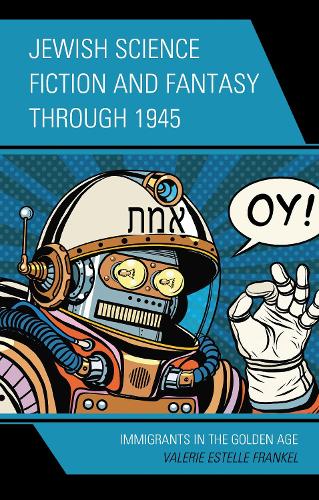
Jewish Science Fiction and Fantasy through 1945: Immigrants in the Golden Age
(Paperback)
Available Formats
Publishing Details
Jewish Science Fiction and Fantasy through 1945: Immigrants in the Golden Age
By (Author) Valerie Estelle Frankel
Bloomsbury Publishing PLC
Lexington Books
29th January 2025
United States
Classifications
Professional and Scholarly
Non Fiction
Literary studies: fiction, novelists and prose writers
Graphic novel / Comic book / Manga: styles / traditions
Science fiction
Fantasy
Popular culture
Physical Properties
Paperback
230
Width 152mm, Height 229mm
Description
Science fiction first emerged in the Industrial Age and continued to develop into its current form during the twentieth century. This book analyses the role Jewish writers played in the process of its creation and development. The author provides a comprehensive overview, bridging such seemingly disparate themes and figures as the ghetto legends of the golem and their influence on both Frankenstein and robots, the role of, Jewish authors and publishers in developing the first science fiction magazine in New York in the 1930s, and their later contributions to new and developing medial forms like comics and film. Drawing on the historical context and the positions Jews held in the larger cultural environment, the author illustrates how themes and tropes in science fiction and fantasy relate back to the realities of Jewish life in the face of global anti-Semitism, the struggle to assimilate in America, and the hope that was inspired by the founding of Israel.
Reviews
I have a special appreciation for Valerie Frankels compilation of this, the first volume of her Jewish Science Fiction and Fantasy series. As the contributor of a 20-page entry to the Encyclopedia Judaica (2nd Edition) on the same topic back in 1999, I thought Id hit all the beats. Alas, not even close. Yids in space! You have no idea. Scholars and fans rejoice, because this mammoth and indispensable undertaking will not soon be surpassed. -- Sheldon Teitelbaum, co-editor of Zions Fiction: A Treasury of Israeli Speculative Literature
Frankel takes a broad view of speculative fiction and traces the way the Jewish people throughout history have used science, the supernatural, and fantasy to explain and interact with the world around them. Her willingness to be expansive in her subject matter allows her to gather evidence that strays far beyond the traditional definition of the genre, but clearly fits. The formalization of science fiction as a genre included numerous Jewish authors, editors, and publishers and Frankel provides a rationale for their participation, demonstrating that it is the latest evolution in a long history of using the same techniques of understanding their world and trying to bring about social and scientific change. -- Steven H. Silver, author of After Hastings
Author Bio
Valerie Estelle Frankel teaches at Mission College and San Jose City College.
